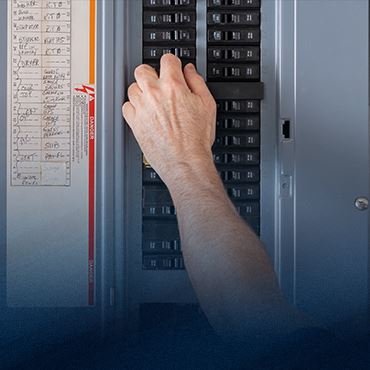Fifth-Generation Farmer Revives a Family Tradition
.jpeg)
Fifth-Generation Farmer Revives a Family Tradition
Larry Banowetz has raised pigs on his family farm in eastern Iowa for 45 years. But the hog industry, or pork industry as it’s now referred to as, has changed dramatically over that time. Larry says that in the United States, it is almost impossible to have a profitable small business as an independent pork producer.
“On the commercial market, you just kept losing outlets to sell your pigs,” says Larry. “In the last 10 or 15 years, the number of outlets for the commercial producer to sell their pigs dramatically dropped. [Until] it was basically just Tyson.”
Yet Larry’s son Caleb has always had an interest in raising pigs. In 2018, Caleb took over the family’s hog farming work, becoming a fifth-generation Banowetz farmer as a junior in high school. He remembers facing the same hurdles his father warned him about.
“The market selling commercially small-scale was really bad economically for me,” says Caleb. “It was tough to find buying stations…So you would drive an hour and a half away, and the price was just terrible. I was losing money each year. I don’t know how many more years I could have kept going backwards on my money, trying to make it work.”
“Sometimes you get funny looks. ‘Oh my gosh, you’re raising pigs outside. What are you doing?’” says Caleb.
Raising pigs outdoors requires less equipment and lower input costs, Caleb explains, but also more labor. He prefers putting in the extra work to see his pigs outside. Unfortunately, after his first couple of years pig farming, Caleb hadn’t been able to show bankers he could profitably raise his animals on a small scale outdoors. Some refused to continue lending him money.
Then, in 2021, one of Caleb’s college professors introduced him to Niman Ranch, a network of more than 600 small to mid-sized, independent U.S. family farmers and ranchers who uphold high standards of sustainable and humane farming practices. In exchange, they access a stable, premium market for their hogs.
Caleb was immediately drawn to the opportunity. Larry was supportive, but he remembers finding the concept hard to believe: “I was like, how’s this going to work out?”
Niman Ranch farmers raise pigs outdoors with deep bedding—the way the Banowetz family has always done—but they are also antibiotic-free. Transitioning away from antibiotics was a leap of faith for the family, Larry admits, and both he and Caleb were surprised by the result.
“I was around pigs for 45 years until he brought this Niman,” says Larry. “With antibiotic-free…you worry about death and loss. I have been amazed at how healthy [the pigs] are and how they’ve done…it’s really worked out well for Caleb.” They focus on raising their pigs in low stress environments and boosting the pigs’ immune systems naturally.
“Niman Ranch helps the farmer out by putting money in their pocket to help expand, whereas in the commercial market, you’re out there on your own. There’s nobody to help you,” says Caleb, who received scholarships from the Niman Ranch Next Generation Foundation to pay his way through college as well as grants to get his operation off the ground.
Caleb is now expanding his farm to raise about 2,000 pigs. He can now show bankers a “flat line of income,” as opposed to the ups and downs typical of the commercial market. He recently purchased his own farm and plans to use his pig manure to fertilize crop fields and
build soil health.
Caleb and Larry hope to give the next generation an easier entry into farming, should they choose to continue the family legacy.
“You’re going to have a positive financial outcome here. That’s a big deal to provide some stability; it helps bring the younger generation back,” says Larry. “I wish I would have known about it, honestly. I would have been raising pigs for Niman Ranch for 20-plus years now, had I known.”
Comments
You must be logged in to comment.
Latest Articals
-
Why Mental Health Support Is Essential for Long-Term Wellness
Long-term wellness is not only about physical fitness or the absence of illness; it also depends heavily on emotional stability and psychological balance. In today’s fast-paced world, people face constant pressures from work, relationships, finances, and social expectations. Without proper support, these pressures can slowly affect emotional health. Access to Mental Health Resources plays a vital role in helping individuals manage challenges, maintain balance, and build a healthier future.Understanding Emotional Well-Being and Its ImportanceEmotional well-being influences how people think, feel, and respond to everyday situations. When mental health is neglected, even small problems can feel overwhelming. Over time, unmanaged stress and emotional strain may lead to anxiety, burnout, or persistent low mood. Recognizing emotional needs early allows individuals to take proactive steps before issues become deeply rooted.Support systems focused on mental health help people understand their emotions, develop self-awareness, and respond to life’s challenges more effectively. These systems are not...
-

Your Go-To Commercial & Residential Plumbing Experts in Conyers – tksons
Plumbing is one of those essential systems that often goes unnoticed—until something goes wrong. From unexpected leaks to major system failures, plumbing issues can disrupt both homes and businesses in an instant. That’s why having experienced commercial plumbing contractors in Conyers and dependable residential plumbing services in Conyers is crucial. tksons has become a trusted name in the Conyers area by delivering reliable, efficient, and long-lasting plumbing solutions for every type of property.Comprehensive Commercial Plumbing Services in ConyersCommercial plumbing requires precision, experience, and a deep understanding of complex systems. Businesses depend on properly functioning plumbing to maintain hygiene, safety, and daily operations. As leading commercial plumbing contractors in Conyers, tksons provides tailored plumbing services for offices, retail stores, restaurants, apartment complexes, and industrial facilities.Our commercial services include pipe installation and repair, water supply line management, drainage and sewer services, restroom plumbing, and preventive maintenance programs. We understand that downtime can be costly, so our team works efficiently...
-

Expert Electrician in Buckhead Offering Safe & Modern Electrical Solutions | mccelec
Electrical systems play a crucial role in keeping homes and businesses safe, functional, and efficient. From powering daily activities to supporting advanced technology, reliable electrical work is essential. If you’re searching for professional electrical services in Buckhead, mccelec is your trusted local choice, delivering dependable solutions backed by experience, safety, and quality workmanship.The Importance of Hiring a Qualified Electrician in BuckheadElectrical issues are not just inconvenient—they can be dangerous if handled improperly. Faulty wiring, overloaded circuits, or outdated panels can increase the risk of fires, power failures, and equipment damage. Hiring a certified electrician Buckhead property owners trust ensures that every job is completed according to safety standards and local electrical codes.With mccelec, you get skilled electricians who understand the complexities of modern electrical systems and provide solutions that are both effective and long-lasting.Complete Residential Electrical Services in BuckheadYour home’s electrical system should be safe, reliable, and designed to meet your lifestyle needs. mccelec offers comprehensive...
-

Best Computer Academy in Jaipur – Learn Skills That Build Your Career
In today’s digital world, computer education is no longer optional—it is a necessity. Whether you are a student, job seeker, or working professional, learning the right computer skills can open many doors. Jaipur has become a growing hub for quality education, and choosing the right institute can make a big difference in your future.If you are searching for the best computer academy in Jaipur, best training center in Jaipur, or best coaching institute in Jaipur, this blog will guide you clearly and honestly.Best Computer Academy in JaipurWhen students search for the Best Computer Academy in Jaipur, they look for quality education, practical training, and career support. A good computer academy should focus on real-world skills, updated courses, and experienced trainers.GPS Computer Academy, Jaipur stands out because it offers AI-Powered Education and Training designed for today’s competitive world. The academy focuses on helping students understand concepts easily and apply them practically....
-
.jpeg)
Adult Orthodontic Options for Healthier, Aligned Smiles in Sea Girt, NJ
Adult orthodontic treatment has become an increasingly popular choice for improving both dental health and appearance. At Your Dentalist in Sea Girt, NJ, adults have access to modern orthodontic options designed for comfort, discretion, and efficiency. Straighter teeth are not only about aesthetics but also about maintaining long-term oral health.Many adults seek orthodontic care to correct shifting teeth, bite problems, or alignment concerns that were never treated earlier. With today’s advanced solutions, achieving a healthy, aligned smile is more accessible than ever. Why Adults Choose Orthodontic TreatmentAdult orthodontic care addresses issues that can affect daily comfort and dental health. Misaligned teeth may contribute to uneven wear, jaw discomfort, and difficulty cleaning certain areas. Orthodontic treatment helps correct these problems and supports overall oral function.Beyond health benefits, orthodontic care enhances confidence. A well-aligned smile often improves personal and professional interactions. Common Orthodontic Concerns in AdultsAdult patients often experience dental changes over...
-

How AI-Powered Link Building Is Replacing Traditional SEO Outreach
For years, link building meant endless emails, uncertain replies, and backlinks that didn’t always improve rankings. In 2026, that model is breaking fast. Businesses now want clarity, control, and competitive data—not guesswork.This shift has pushed SEO teams toward intelligent platforms that combine link building services, link building marketplaces, and SEO link building services into one streamlined workflow. Vefogix sits right at the center of this evolution.Link Building Services: Moving Beyond Random BacklinksLink building services are designed to help websites earn authoritative backlinks that improve search visibility. But modern SEO demands more than simple link placement.Outdated services often:Focus on quantity instead of relevanceHide publisher detailsProvide links without performance insightsToday’s link building services are strategy-driven, guided by competitor data and real-world results.How Vefogix Redefines Link Building ServicesVefogix applies AI to the entire link-building process:Identifies backlink sources already working for competitorsHighlights trusted, niche-relevant websitesEliminates risky or low-value domainsGives full transparency before you investThis...